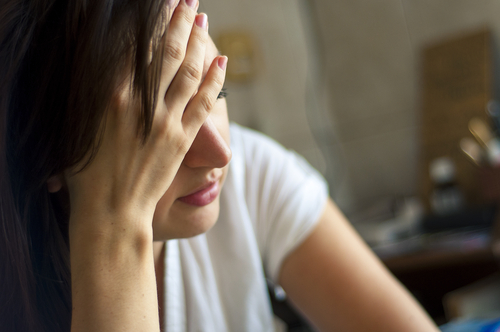Depression: When It’s More Than Just Sadness
Written by |

Like many lupus patients, my life didn’t exactly go as planned. While my friends were all settling into their lives, mine was beginning to unravel.
I had just been declared in remission from a rare blood disorder known as thrombotic thrombocytopenic purpura (TTP). I was looking forward to getting on with my life and had plans to open my own insurance office, when things took a turn. I started experiencing severe joint pains and a butterfly rash and was referred to a rheumatologist. I was diagnosed immediately with lupus. Years of experimenting with prescription drugs would prove fruitless and I was placed on Social Security disability.
my own insurance office, when things took a turn. I started experiencing severe joint pains and a butterfly rash and was referred to a rheumatologist. I was diagnosed immediately with lupus. Years of experimenting with prescription drugs would prove fruitless and I was placed on Social Security disability.
Living on Social Security isn’t easy and the stress of that alone was enough to put me into a severe depression. Instead of dealing with it at the time, I hid my feelings. Somehow I felt that if I remained strong and positive this all would go away. But depression isn’t like sadness and it doesn’t just go away.
Eventually, I moved back with my parents. Things only compounded when my lupus began to attack my brain and, a few months after my 40th birthday, my license was taken away. There it was, yet another setback in my life. I was beginning to feel like a burden on my family and friends. I lost interest in activities and started to alienate myself. My pain levels soared and my disease worsened. I tried to mask my depression, but that made things worse. I didn’t want anyone to see what was really going on inside and a part of me didn’t want to see it either. On the outside I looked great, but on the inside I was falling apart.
I thought I could handle this on my own. After all, I was just sad. I just had to keep telling myself to pull it together and it eventually would would be okay. Little did I know this was not the way to handle things.
I began to have passive thoughts of suicide. Never meaning to act on it, but always feeling like things would be better for everyone else if I were not around.
The feelings of being a burden intensified as I struggled to keep my head above water. I was afraid to tell a psychiatrist what I was feeling for fear of being admitted. Finally, when I couldn’t handle it anymore, I reached out for help. Shortly after I was diagnosed with clinical depression.
What is clinical depression?
Clinical depression is defined as a depression so severe as to be considered abnormal, either because of no obvious environmental causes, or because the reaction to unfortunate life circumstances is more intense or prolonged than would be expected, Symptoms include:
- Sadness or feeling “empty” or easy to tear
- Loss of interest in pleasurable activities, hobbies
- Irritability or frustration
- Hopelessness, pessimism
- Reduced sex drive
- Change in sleep pattern
- Change in appetite (depression and weight gain, weight loss)
- Anxiety
- Slowed thinking and movements
- Tiredness, loss of energy
- Low self-esteem, guilt
- Thoughts of death
It’s important to monitor your feelings and symptoms and to seek help when needed.
Treatments and therapy
There are several treatments that can help a person deal with depression. While some people may benefit from counseling, others may depend on prescription drugs to alleviate their symptoms. Lifestyle changes also can positively affect a person with depression.
Remember that depression is more than just sadness and that it will take time to find the right treatment. Medications alone will not resolve your depression and you may need to make changes to your lifestyle as well. Find a good social support network. Whether it be family, a friend or another patient, make sure you have someone in whom you can confide. Know that asking for help is not a sign of weakness.
Had I known the severity of depression earlier I might have been able to help myself sooner. Today I am undergoing therapy and medication for the treatment of my depression. I can’t be sure that it will not happen again, but at least the next time I will be prepared.
If you think you may be depressed, don’t be afraid to ask for help.
***
Note: Lupus News Today is strictly a news and information website about the disease. It does not provide medical advice, diagnosis, or treatment. This content is not intended to be a substitute for professional medical advice, diagnosis, or treatment. Always seek the advice of your physician or other qualified health provider with any questions you may have regarding a medical condition. Never disregard professional medical advice or delay in seeking it because of something you have read on this website. The opinions expressed in this column are not those of Lupus News Today, or its parent company, Bionews Services, and are intended to spark discussion about issues pertaining to lupus.





Dalila
Good short article!
Christine Von Raesfeld
Thanks for reading!